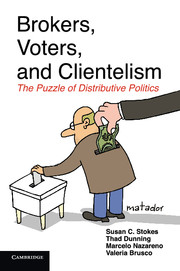Book contents
- Frontmatter
- Dedication
- Contents
- List of Tables
- List of Figures
- Preface and Acknowledgments
- I MODALITIES OF DISTRIBUTIVE POLITICS
- II THE MICRO-LOGIC OF CLIENTELISM
- 2 Gaps Between Theory and Fact
- 3 A Theory of Broker-Mediated Distribution
- 4 Testing the Theory of Broker-Mediated Distribution
- 5 A Disjunction Between the Strategies of Leaders and Brokers?
- 6 Clientelism and Poverty
- III THE MACRO-LOGIC OF VOTE BUYING: WHAT EXPLAINS THE RISE AND DECLINE OF POLITICAL MACHINES?
- IV CLIENTELISM AND DEMOCRATIC THEORY
- Appendix A: Argentina Brokers' Survey
- Appendix B: Argentina Voters' Surveys
- Appendix C: Venezuela Voters' Survey and the Maisanta Database
- Appendix D: India Voters' Survey
- References
- Index
- Miscellaneous Endmatter
6 - Clientelism and Poverty
Published online by Cambridge University Press: 05 June 2014
- Frontmatter
- Dedication
- Contents
- List of Tables
- List of Figures
- Preface and Acknowledgments
- I MODALITIES OF DISTRIBUTIVE POLITICS
- II THE MICRO-LOGIC OF CLIENTELISM
- 2 Gaps Between Theory and Fact
- 3 A Theory of Broker-Mediated Distribution
- 4 Testing the Theory of Broker-Mediated Distribution
- 5 A Disjunction Between the Strategies of Leaders and Brokers?
- 6 Clientelism and Poverty
- III THE MACRO-LOGIC OF VOTE BUYING: WHAT EXPLAINS THE RISE AND DECLINE OF POLITICAL MACHINES?
- IV CLIENTELISM AND DEMOCRATIC THEORY
- Appendix A: Argentina Brokers' Survey
- Appendix B: Argentina Voters' Surveys
- Appendix C: Venezuela Voters' Survey and the Maisanta Database
- Appendix D: India Voters' Survey
- References
- Index
- Miscellaneous Endmatter
Summary
INTRODUCTION: POVERTY OF NATIONS AND OF VOTERS
Part II of this book constructs a model of clientelism that pivots around the behavior of types of individuals – party leaders, brokers, and voters. Part III examines macro-dynamics of clientelism: why it persists and what forces may undermine it, with an emphasis on historical developments at the national level.
The current chapter marks a transition between micro and macro concerns. Here we study the link between clientelism and poverty. The broker-mediated model in Chapter 3 included assumptions about how wealthy and poor voters differ in the utility they derive from expressions of political loyalties and from money. These assumptions, and what may lie behind them, are our focus here. The national experiences of shifts from clientelism to nonconditional distribution, to pork-barrel politics, and even to programmatic distribution, explored in Part III, have much to do with changes in income levels and in income distribution. Hence, before shifting to these accounts, it is helpful to pause and examine more closely the evidence about poverty and clientelism.
Imagine drawing a country at random from a list of all those in which competitive national elections are regularly held. If one had to guess whether clientelism was widely practiced in the country selected, one's guess would probably be improved by knowing how wealthy the country is – its per capita gross domestic product (GDP) and income distribution.
- Type
- Chapter
- Information
- Brokers, Voters, and ClientelismThe Puzzle of Distributive Politics, pp. 152 - 172Publisher: Cambridge University PressPrint publication year: 2013
- 12
- Cited by



